Dogs often exhibit this apparently odd behavior, but it is quite common among them. Understanding the reasons behind it can help you appreciate your furry friend’s needs and strengthen the bond you share. In this blog post, we will explore the various reasons for “Why Does My Dog Prefer Sitting Behind Me On The Floor?”
Your dog sits behind you on the floor for comfort and security, signifying trust and a desire to be near you.
Comfort and Security
You may find that one reason your dog prefers sitting behind you on the floor is the sense of comfort and security it provides for him. As pack animals, dogs often seek closeness with their pack members, including you. Your dog feels protected and safe by sitting behind you. In the wild, dogs naturally assume positions that provide them with security while allowing them to keep an eye on their surroundings. They sit behind you, providing a sense of security and reassurance in your home.
Temperature Regulation
Dogs seek out cooler spots to regulate their body temperature, often finding relief from the floor, which is usually cooler than the couch or cushioned chair, especially if it’s tiled or made of wood. In warmer months, your dog may choose to lie on the cool floor for comfort. In cooler months, they may opt for a spot behind you where they can enjoy your warmth without overheating.
Bonding and Affection
Dogs exhibit their instinctive affection and closeness by sitting near you, sometimes even behind you, as a way to bond. Your dog expresses its affection and desire to be close to you by choosing a spot near you. Their proximity to you is a sign of their attachment and love, even if they aren’t directly in your lap.
See also: DOG KEEPS LOOKING UP AT THE CEILING AND SNIFFING
Observation and Monitoring
Your dog may sit behind you to have a better view of its surroundings. Dogs are naturally vigilant and protective, observing their environment closely. They can observe the environment strategically from behind you without obstructing the way. You allow them to keep an eye on any potential threats or changes in the surroundings from this position, staying close to you.
Habit and Routine
Dogs find comfortable spots behind people and establish routines. If your dog has found such a spot and is regularly allowed to sit there, it may develop into a habitual behavior. They may develop a preference for this spot over time because they have made it part of their routine. Once a spot is established as a favorite, dogs are likely to return to it frequently, finding comfort in its consistency. This is common for many dogs.
Instinctual Behavior
Wild canines often follow their pack leaders and assume positions strategically, sitting behind them, as an instinctual behavior rooted in their ancestry for staying safe and being alert. Your dog will naturally follow other members of the pack and sit behind you, taking up a position that allows them to observe you as the leader and remain close to you as their follower.
Your dog watches your back from behind you, ensuring your safety. They can observe the environment and quickly react to any potential threats from this position.
See also: WHY DOES MY DOG WAIT OUTSIDE THE BATHROOM DOOR FOR ME?
FAQs
Is it normal for my dog to sit behind me?
Many dogs find comfort and security by sitting close to their owners. They do this to feel safe and connected.
Should I be concerned if my dog prefers sitting on the floor?
Your dog doesn’t have to be sick or uneasy for him to choose to sit on the floor.
Does sitting behind me indicate any health issues?
If your dog shows signs of discomfort, pain, or any sudden changes in behavior, you should consult with a veterinarian to rule out any potential health issues.
Why Does My Dog Hide Behind Me?
When your dog hides behind you, it may be out of fear, seeking protection, feeling insecure, or as a sign of trust and comfort in your presence.
Final Words
In this article, we have explored all the reasons why your dog sits behind you on the floor. Your pet behaves in different ways for a variety of reasons, including comfort, connection, temperature regulation, observation, habit, or instinct.
Understanding these reasons can help you create a more peaceful and encouraging environment for them.

